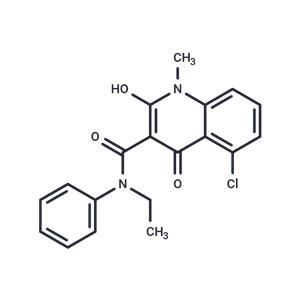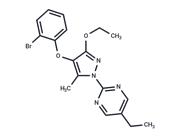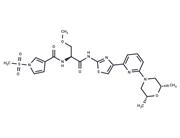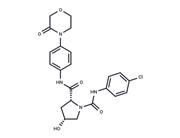| Name | Laquinimod |
| Description | Laquinimod (LAQ) is an effective immunomodulator, which is currently under development in phase III trials for the treatment of multiple sclerosis as an oral therapy. |
| Cell Research | The peripheral blood mononuclear cells (PBMC) are incubated with Laquinimod for 24 hours. Cell viability is measured on total PBMC by propidium iodide (PI) staining using an automated cell counter. Protein expression level is assessed in PBMC samples by Western blot using anti-HLA-DQA/DQB monoclonal antibodies.(Only for Reference) |
| In vitro | Laquinimod treatment at 0.1-1 μM does not affect the viability of peripheral blood mononuclear cells (PBMC). By performing the large-scale gene expression microarray analysis in PBMC from healthy subjects or relapsing-remitting multiple sclerosis (RRMS) patients, Laquinimod is shown to induce suppression of genes related to antigen presentation and corresponding inflammatory pathways. Laquinimod induces activation of Th2 response in CD14+ and CD4+ cells and suppression of proliferation in CD8+ cells. Laquinimod displays significant effects on immune modulation related to the suppression of antigen presenting mechanism followed by a decrease of chemotaxis and adhesion, and exhibits potent anti-inflammatory potency through the suppression of the NF-κB pathway that concordantly leads to the activation of apoptosis of immuno-competent cells. [5] |
| In vivo | Administration of Laquinimod (0.16-16 mg/kg/day) dose-dependently inhibits the incidence of experimental autoimmune neuritis (EAN) in Lewis rats, ameliorates Clinicalal signs and inhibits P0 peptide 180-199-specific T cell responses as well as the inflammation and demyelination in the peripheral nerves, suggesting that Laquinimod may mediate its effects by regulation of Th1/Th2 cytokine balance. [1] Laquinimod significantly inhibits the development of murine acute experimental autoimmune encephalomyelitis (EAE), being approximately 20 times more potent than the immunomodulator roquinimex. [2] Laquinimod treatment inhibits the development of experimental autoimmune encephalomyelitis (EAE) in the Lewis rat in a dose-dependent manner, and shows better disease inhibitory effects as compared to roquinimex (Linomide). [3] Laquinimod potently inhibits the development of chronic experimental autoimmune encephalomyelitis (chEAE) in IFN-beta k.o. mice and wild type mice. [4] Laquinimod reduces Clinicalal signs, inflammation, and demyelination in C57BL/6 mice with active EAE induced with MOG(35-55) peptide, and down-regulates VLA-4-mediated adhesiveness and pro-inflammatory cytokines such as IL-17. [6] The study of Laquinimod in the mice model of EAE using a conditional BDNF knockout strain lacking BDNF expression in myeloid cells and T cells (LLF mice) indicates Laquinimod also modulates autoimmune demyelination via induction of brain-derived neurotrophic factor (BDNF). [7] |
| Storage | Powder: -20°C for 3 years | In solvent: -80°C for 1 year | Shipping with blue ice. |
| Solubility Information | Ethanol : 1 mg/mL (2.8 mM)
H2O : < 1 mg/mL (insoluble or slightly soluble)
DMSO : 8 mg/mL (22.42 mM), Sonication is recommended.
|
| Keywords | inhibit | multiple sclerosis | relapsing remitting | Laquinimod | carboxamide | Nuclear factor-kappaB | Apoptosis | Inhibitor | ABR 215062 | Nuclear factor-κB | immunomodulator | ABR215062 | chronic progressive | neurodegenerative disease | inflammation | NF-κB | Orally | neurodegeneration |
| Inhibitors Related | Stavudine | 5-Fluorouracil | Myricetin | Sodium 4-phenylbutyrate | L-Ascorbic acid | Dextran sulfate sodium salt (MW 4500-5500) | Metronidazole | Sorafenib | Tributyrin | Diallyl disulfide |
| Related Compound Libraries | Bioactive Compound Library | Anti-Neurodegenerative Disease Compound Library | EMA Approved Drug Library | Anti-Cancer Clinical Compound Library | Drug Repurposing Compound Library | CNS-Penetrant Compound Library | Anti-Cancer Approved Drug Library | Anti-Aging Compound Library | Bioactive Compounds Library Max | Anti-Cancer Drug Library |

 United States
United States



